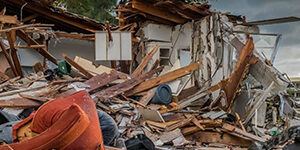From this article: https://www.desiringgod.org/interviews/should-we-call-out-false-teachers-or-ignore-them
And then in 1 Timothy 5:19–20, Paul went beyond just “avoid them” to “rebuke them publicly.” So, speaking of elders who persist in error, he said, “Do not admit a charge against an elder except on the evidence of two or three witnesses. As for those who persist in sin” — and that can be sin of false doctrine or sin of evil behavior, anyone who does not accept correction — “rebuke them in the presence of all, so that the rest may stand in fear..”
And then Paul went on and actually named destructive false teachers:
- “Demas, in love with this present world, has deserted me” (2 Timothy 4:10).
- “You are aware that all who are in Asia turned away from me, among whom are Phygelus and Hermogenes” (2 Timothy 1:15).
- “By rejecting this [faith and a good conscience], some have made shipwreck of their faith, among whom are Hymenaeus and Alexander” (1 Timothy 1:19–20).
- “Their talk will spread like gangrene. Among them are Hymenaeus and Philetus” (2 Timothy 2:17).
Paul names at least six false teachers that the church should watch out for.
So, I infer from Jesus and Paul and Luke and John that false teaching and destructive behavior are present dangers in this fallen world for the church. And all of us — especially shepherds, pastors — should be alert and discerning to identify and, in appropriate ways, expose. In order to protect the flock, we should expose them and minimize the spread of the gangrene (as Paul calls it).
So the question is how and when — not if. And here I think the Bible calls for wisdom, rather than telling us who and when and how. The question we ask is this: How can we best — in our situation, with our gifts and our responsibilities — help the most people believe and live the most truth, and how can we protect the most people from destructive beliefs and behaviors?
And here are five factors perhaps to consider when deciding whether to name a false teacher publicly.
- The seriousness and deceitfulness of the error.
- The size of the audience. Is it growing?
- The duration of their ministry. Did they make one blunder or are they constantly doing it?
- The vulnerability of the people for whom you are responsible.
- The role you have in influencing shepherds who really need to be discerning for who the false teachers are.
When you do name a false teacher, it’s best to do it in a setting where you do more than name-drop. You explain the error, you give reasons for rejecting it, you communicate complexities, you set a tone of longing for truth and love — you’re not just slinging mud.
The last thing I would say is to let your teaching be so powerful in clarifying the greatness and the beauty and the worth of God’s truth that your people will smell error before it infects their lives. The shape of error is always changing. You can’t preach enough negative sermons to stay ahead of it. And you don’t have to. The best protection against the darkness of error is the light of truth.




